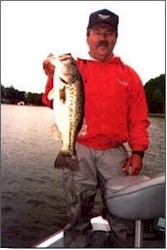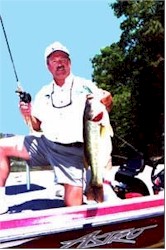Just One Choice!
by Alan Paczkowski
If you had to pick one bait to spend the remainder of your bass
angling days fishing with, what would it be? Tough question;
especially when one reflects on the multitude of effective bass
catching baits on the market today.
 My guess is, if faced
with the above dilemma, most bass anglers would select a plastic
worm, lizard, or a jig-and-pig. All great choices. But not me! My
hands down, without hesitation, "no brainer" selection
would be a spinnerbait. Why? Simple, a spinnerbait is without
question the most versatile bait on the market today. My guess is, if faced
with the above dilemma, most bass anglers would select a plastic
worm, lizard, or a jig-and-pig. All great choices. But not me! My
hands down, without hesitation, "no brainer" selection
would be a spinnerbait. Why? Simple, a spinnerbait is without
question the most versatile bait on the market today.
Think about it, you can effectively present a spinnerbait
under a myriad of conditions, in all types of cover or structure,
and in every season. Whether it's summer, fall, winter, or
spring. Whether the water is hot, cold, muddy or clear. Whether
you are fishing deep, or just below the surface. Whether you are
working weeds, grass, brush, standing timber, stumps, rock piles,
boat docks, rip-rap or any other particular type of cover or
structure, a spinnerbait is tough to beat.
Fact is, spinnerbaits probably account for catching more bass
than any other bait. So, just what is it that makes the
spinnerbait such a consistent bass catcher?
For certain, it is not because a spinnerbait resembles any
form of natural forage; because it doesn't. It does however
represent a combination of elements which are attractive to bass.
Spinnerbaits offer unlimited combinations of flash, vibration,
color, and profiles. Additionally they are quiet, non-threatening
baits which act naturally. Properly match the above
characteristics to the existing conditions and bass find them
quite irresistible.
Don't get me wrong. I am not suggesting that spinnerbaits are
the magic key to bass catching consistency. What I am saying is
that no other single bait offers the versatility, flexibility,
and capability to be properly presented under every imaginable
fishing condition and scenario as does the spinnerbait.
Basics. Now that you know how I
feel about spinnerbaits it only seems fair that I share a few
basic considerations I use when deciding which one to tie on.
Space constraints limit today's discussion to a very few
spinnerbait fundamentals. As with every aspect of successful bass
angling, on-the-water experimentation under various conditions is
the best way to fine tune the basics of spinnerbait angling.
Blade Types. Spinnerbait blades
come in a variety of blade types. Today we'll just discuss the
most common:
- Willow Leaf. Generally speaking, I believe a
Willow Leaf blade is the best all-around choice for fishing clear
or slightly stained water. Why? Its shape provides sufficient
flash and vibration without spooking the bass. Additionally it
can be presented in much heavier cover and worked at faster
speeds than the other two common types.
- Colorado. When fishing cold or muddy water I
prefer a Colorado blade because it displaces a lot of water,
gives off more vibration, and can be presented much slower than a
Willow Leaf can. Remember that cold or muddy water conditions
dictate a slower presentation and some "noise" so the
bass can more easily locate and respond to your bait under
conditions of reduced metabolism or visibility. Colorado blades
fulfill both concerns.
- Indiana. Lastly there is the Indiana blade,
which is tearshaped and a compromise between the Colorado and
Willow Leaf. Indiana blades produce good vibration, a lot of
flash and displace an ample quantity of water. They are my choice
when fishing warm stained or warm muddy water when the bass are
active.
Single Blades. Single spinnerbaits
(one blade) are the most common and versatile. They can be fished
deep, shallow, and with a variety of retrieves (stop-and-go,
straight, helicoptered, fluttered, Yo-Yo). Their clean design
allows them to be fished in cover with minimum snags or hang-ups.
They also produce more vibration than tandem blades (two blades).
One drawback to single blades is their tendency to roll to the
side when retrieved at a high speed. Not a desirable
presentation!
Tandem Blades. Tandem spinnerbaits
offer more flash and lift than do single spins. They are
excellent choices when a lot of flash or more lift is desired.
More importantly they can be worked at higher speeds through
shallow cover when the bass are in an active mood and cruising.
Tandems are the perfect choice for "buzzing" or
"burning" your bait just under the surface to create a
bulge or wake. When the bass are active and shallow, tandem
blades are hard to beat. On the other hand, they are not a good
choice for deep water, slow rolling, or vertical drop
presentations.
Blade Size. Blades are available
in many different sizes. On most spinnerbaits you can switch
blades to achieve different combinations of size, color, flash,
vibration, and depth. A numbering system starting from #00
(smallest) to #8 (largest) is used. Blade sizes are arbitrary;
that is, a #3 Colorado is not the same size as a #3 Willow Leaf.
I prefer to start with smaller blades in the spring (#2 or #3)
and move to larger blades as the season progresses. If the bass
are feeding on shad I try to match my blade size to the size of
their body. As with all baits, don't be afraid to experiment
until the bass tell you what they want. Different conditions call
for different sizes, colors, and presentations.
Blade Color. Blade finishes can be
painted, flat metallic, or hammered. Silver, gold, and copper are
the most common colors. However, don't overlook the whole new
family of painted blades which has invaded the market. Water
clarity and light conditions dictate my blade color choice. In
clear water I prefer silver. On tandem spins I often use a
silver/gold combination. Blades with the new metalflake finishes
are also big favorites. Even though they don't emit the same
amount of brilliance metallic blades do; they produce a lot of
flash which is broken up into numerous tiny flashes - just like a
school of baitfish flitting through the water. Try them, they
work!
Skirt Color. Once again there are
more colors available than you can imagine. As you may have
guessed, water clarity, light conditions, and available forage
dictate my choice. When the water is clear I prefer skirts in a
clear silverflake, clear green, or clear pepper color. I also
like to add a few strands of red, blue, or gold to the above.
Solid white is also a good choice. In stained water chartreuse
and white or chartreuse and blue are solid picks. Muddy water
calls for pure chartreuse or a firetiger pattern. Of course, at
night or on dark, heavily overcast days colors like black or
purple work well.
 Trailers.
I believe in them and I use them. Why? They add color, wiggle and
provide bulk. Under most conditions white or pearl-white are my
favorite. Chartreuse adds often needed visibility. A good rule of
thumb for trailer colors is to complement your skirt color. Try
to avoid dramatically contrasting skirt/trailer combinations. Trailers.
I believe in them and I use them. Why? They add color, wiggle and
provide bulk. Under most conditions white or pearl-white are my
favorite. Chartreuse adds often needed visibility. A good rule of
thumb for trailer colors is to complement your skirt color. Try
to avoid dramatically contrasting skirt/trailer combinations.
That's the Basics of Bass Know-How.
As usual I could go on and on. We've barely scratched the
surface. There is so much more about spinnerbaits we need to talk
about. Maybe in a future article at Bassdozer. In the interim, if
you have any questions give me a call.
Till next time, have fun fishing, be safe and courteous on the
water, and please practice catch and release so we all can enjoy
bass fishing for many years to come.
| Author Information.
Hi. Alan Paczkowski here. If you have any questions give me a
call. Better yet let's get together and put the basics of bass
know-how to the test out on beautiful Lake Gaston where I operate
a professional guide service. Just give me a call to
reserve your bass fishing date or to order a Gift Certificate for
the special bass angler in your life.
Give Alan a call at (252)
586-2770
Visit Alan's web site at Alan's Guide Service
Email Alan at lakepacz@3rddoor.com
|
|
